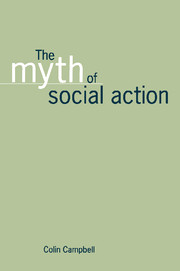Book contents
- Frontmatter
- Contents
- 1 Introduction
- 2 Action reported missing in action theory
- 3 Action and social action
- 4 Action versus social action
- 5 The rise of social situationalism
- 6 The argument by denial
- 7 Accounts and actions
- 8 The argument by exclusion
- 9 The argument through incorporation
- 10 The ‘learning everything from others’ thesis
- 11 The communicative act paradigm
- 12 The linguistic turn for the worse
- 13 The myth of social action
- 14 The obstacle which is social situationalism
- 15 Epilogue: bringing action back in
- Notes
- Bibliography
- Index
14 - The obstacle which is social situationalism
Published online by Cambridge University Press: 07 May 2010
- Frontmatter
- Contents
- 1 Introduction
- 2 Action reported missing in action theory
- 3 Action and social action
- 4 Action versus social action
- 5 The rise of social situationalism
- 6 The argument by denial
- 7 Accounts and actions
- 8 The argument by exclusion
- 9 The argument through incorporation
- 10 The ‘learning everything from others’ thesis
- 11 The communicative act paradigm
- 12 The linguistic turn for the worse
- 13 The myth of social action
- 14 The obstacle which is social situationalism
- 15 Epilogue: bringing action back in
- Notes
- Bibliography
- Index
Summary
Social situationalism is the major obstacle to any further development of the theory of action. Its very existence obscures the need to revitalise such a perspective because it gives the impression that theories of action are already flourishing. Thus, although it really has little connection with that interpretive tradition of sociological analysis which takes ‘action’ as its primary focus, the fact that its subject-matter is given as ‘social action’ and that it is commonly labelled a ‘social action perspective’ means that it is easy for sociologists to mistake it for pan of that tradition; whereas in reality the subject-matter of situationalism is situated conduct, not action. However, because of the widely taken-for-granted status of its anti-mentalist assumptions, together with the hold which the social action syllogism has over the minds of many British sociologists, this point is not widely appreciated. Social situationalism also obstructs the development of a proper theory of action in other ways. For example, the social imperialism which it embodies leads to a denial of the independent realms of the cultural and the psychological, thereby hindering the investigation of the manner in which these dimensions interact to form the phenomenon which is action. In addition, the use of the term ‘social action’ to refer to what is in effect merely communicative action and interaction serves to deflect attention away from the problem of understanding how action is itself accomplished and on to the more hypothetical ‘problem of intersubjectivity’.
- Type
- Chapter
- Information
- The Myth of Social Action , pp. 146 - 154Publisher: Cambridge University PressPrint publication year: 1996



